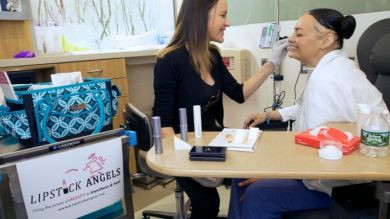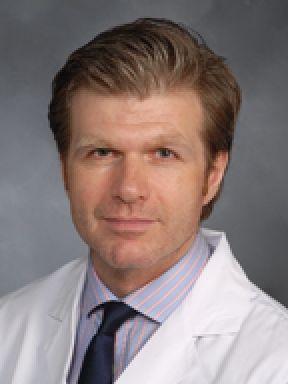Volunteer makeup artists pamper patients during cancer treatment
This is an excerpt of a story that first appeared on FOX News. Read the full article here.
Betty Elkes faced cancer multiple times and received her last diagnosis in 2010. Before going in for treatment, she would always put on her red lipstick, a gesture that stuck with her granddaughter, Renata Helfman.
In the years since Elkes' passing, Helfman, 46, a professional makeup artist, started Lipstick Angels, a non-profit that brings volunteer makeup artists into hospitals to treat them with facials, makeovers and massage treatments using natural and/or organic products vetted by Helfman and the Cedars-Sinai Volunteer Department and the Epidemiology Department.
“It was [my grandmother’s] way of going in there with dignity— feeling like herself, like a woman,” Helfman, who is based in Los Angeles, told FoxNews.com. “I think having a healthy state of mind in all different ways, not only how you choose health care, but the people that surround you and really support you is part of what can actually make someone get out and really heal from that.”
Lipstick Angels has programs in Los Angeles at Cedars-Sinai Medical Center, MemorialCare Todd Cancer Institute at Long Beach Memorial, City of Hope and in New York at NewYork-Presbyterian/Weill Cornell Medical Center. Since their launch at Cedars-Sinai in 2012, the group has served over 2,500 patients.
Helfman specifically wanted the 20-minute treatments to take place in a hospital setting, to make it easier for patients, and also to be with them at a vulnerable time.
“To transport them out of that moment and to do these treatments is huge,” Helfman said. “These outpatients are going out into the world again. They pick up the mirror and they see themselves, they don’t see a cancer patient.”
“They just need to show up with love and artistry,” Helfman said. “Commitment is really big; that is what is unique about us. We’re really building relationships with these women and men.”The 33 volunteer “Angels” are trained as hospital volunteers and each commits to going to the infusion centers twice a month, for at least three hours per visit.
Caring for compromised skin
A significant part of that relationship is properly caring for patients whose skin has been affected by their cancer treatment.
For patients undergoing chemotherapy, the most common side effects to skin are dryness, flakiness, and irritability due to the decreased amount of natural lubricants produced since chemotherapy destroys certain cells. Other possible effects include skin discoloration and heightened susceptibility to sunburn.
For patients who also get radiation therapy, the treatment essentially burns the skin, adding to complications.
At NewYork-Presbyterian/Weill Cornell, hospital staff educates patients on the changes they’ll experience and advises them to change their skincare products a few days before they start chemotherapy in order to prepare. Patients are told to take lukewarm showers or baths, rather than long hot showers.
“Heating up the skin promotes redirection of circulation of the blood to the skin and you can have already irritated, inflamed areas. Increased blood flow actually promotes inflammation,” Dr., a medical oncologist at NewYork-Presbyterian and Weill Cornell Medicine, told FoxNews.com. Within 15 minutes of showering, patients should apply a gentle moisturizer to their skin.
Patients should use fragrance free-, irritant free- and preservative-free skin and body care products, and also buy similarly simple laundry detergent, to avoid any possible irritation.
“We vastly give preference to natural or organic products due to the lack of preservatives and irritants,” Mayer said.
Lipstick Angels gets most of its natural, safe beauty products through donations and natural beauty store Credo gives 1 percent of its sales to Lipstick Angels. Their makeup and skincare supplies remain at the hospitals and each Angel is required to use disposable tools and applicators to avoid the risk of infection.
Losing hair is a big burden for women, especially, and while they can cover up their heads with a wig or scarf, losing eyelashes and eyebrows can be devastating, Mayer said. The Angels work together with nurses to tailor treatments to each patient’s status, and if she’s about to lose her eyebrows, will have eyebrow stencils at the ready.
“Having the Lipstick Angels flying in with some, to my mind, highly sophisticated technology to provide remedies, is a beautiful thing,” Mayer said. “I look forward to what comes of [the program].”
“Sometimes makeup gives you a little bit of a lift”
For their launch at NewYork-Presbyterian/Weill Cornell, the team spent months vetting and training volunteers to work with the nurses there to make the addition of the program seamless. Angel training includes studying hospital codes, privacy policies and learning emergency exits.
“It’s not like strange girls walking around with carts and lipstick. Everyone is informed, educated and already talking about [the program]. It really makes a difference to have the staff engaged,” Helfman said.
The nurses at each hospital are the Lipstick Angels’ allies, and help identify patients for treatment.
The Lipstick Angels have already changed the chemo treatment experience for Toni, 50, a colon cancer patient from New York City.
“It kind of becomes, ‘I have an appointment for a facial,’ rather than, ‘I’m going to the hospital for chemo,’” Toni, who did not disclose her last name for privacy, told FoxNews.com. “I was transported from a place that is clinical, with people being treated in cubicles, and suddenly I could look across and see the Lipstick Angel working with someone and you see joy. It’s a sweet, comforting alterative treatment.”
Toni was diagnosed with colon cancer in Dec. 2014 and now goes for treatment every two weeks for around four hours per session. The part-time occupational therapist had her first Lipstick Angels treatment, a hand massage, on Oct. 21 and is planning to have a facial the next time she goes to the infusion center.
Toni is gradually converting her makeup and skincare products to natural choices, and, as a self-proclaimed lipstick fiend, was thrilled to get the Angels’ gift— each patient gets a lipstick or lip balm— and tips.
“I know that they’re external things, but it kind of works both ways. It makes you feel good on the inside even when you’re working on stuff on the outside. They work hand in hand,” Toni said. “Sometimes makeup gives you a little bit of a lift.”
...
Mayer noted that, while as oncologists and doctors are focused on saving lives, being aware of patients’ psychological burdens has become increasingly important.
“People want to feel good about themselves, feel attractive even if they’re battling a life-threatening disease and the overt effects of treatment is visible on your face, it also serves as a constant reminder of what you’re going through,” he said. “I think it’s perfectly OK to cover that up so you’re not always looking in the mirror and reminded of your cancer.”
...




